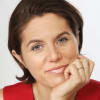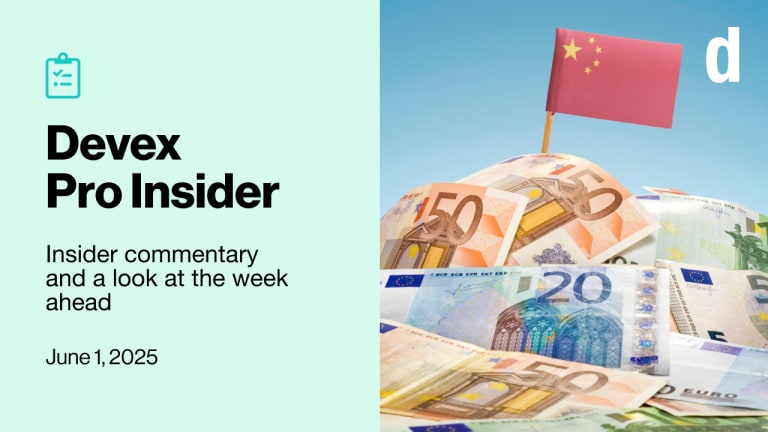How small foundations can punch above their weight
Small grant-making foundations may not be as visible as large donors, but they can make for great partners for nongovernmental organizations whose mission and project align with theirs.
When it comes to international development, the Brussels-based King Baudouin Foundation is a relatively small player. Focused on Africa, its visibility pales in comparison to big donors based in the Belgian capital, including the European Commission. Yet as KBF Managing Director Luc Tayart de Borms explained, nongovernmental organizations and charitable bodies shouldn’t rule out working with foundations such as the KBF: If your mission or project aligns with theirs, he said, small foundations can make for great partners. KBF runs much like a community foundation. Private citizens and corporations, mostly in Belgium, use KBF for their philanthropic investments. “They choose us because of our knowledge, experience and administrative capacity to independently realize their philanthropic vision,” Tayart de Borms said. Outside of Europe, the vast majority of KBF’s work is in Africa with a focus on the Democratic Republic of the Congo and Burundi, where Belgium’s colonial legacy is strongest. When the foundation began to formally work in Africa in 2003, it was heavily focused on HIV and AIDS treatment and prevention. As its donor base and experience grew, it broadened its scope to include everything from environmental issues to economic development. KBF is perhaps best known for its African Development Prize, which began 30 years ago to recognize the contributions that extraordinary organizations and individuals make to development causes in Africa. In addition to being awarded 200,000 euros ($230,000), winners like Nobel Peace Prize nominee Dr. Denis Mukwege, who treats sexual assault victims in the Congo get an instant platform for their cause with policymakers, thought leaders and media around the world. Money matters In 2014, KBF distributed about 9.5 million euros in grants in developing countries, of which Africa, Central Africa in particular, took the largest share. This relatively modest budget has grown steadily, almost doubling in the past five years. Yet, KBF’s spending in developing countries is dwarfed by the 38 million euros it spent in Europe in 2014. Tayart de Borms believes this calculus will change in the future. “Since globalization has created greater awareness of the needs in poor countries like the Democratic Republic of the Congo, we expect donors will gradually want to invest more outside of Europe,” he said. Current donors for projects in Africa represent a broad cross-section of people and companies with some relationship to Belgium. Corporate donors like Cargill, small businesses like beer brewers, philanthropic individuals and families are all part of KBF’s donor base. The challenge for the foundation is to find a way to balance the different demands and interests of this diverse community. How to work with KBF If you are an NGO in Africa, especially in the Congo or Burundi, and are working on issues that align with KBF’s mission and its donor priorities, Tayart de Borms encourages prospective partners to introduce themselves. “Even if there isn’t an opportunity right now,” Tayart de Borms said, “we’ll learn more about your work and keep you in mind for the future.” KBF’s managing director urged NGOs to think carefully before approaching the foundation to co-finance grants from institutions like the European Commission. “Since we fund different organizations and projects than the typical government and operate differently too, it’s hard for NGOs to find an opportunity that works for everyone involved,” he said. At the same time, KBF does want to create more synergies and share resources with governments. Tayart de Borms advises NGOs to learn more about what foundations such as KBF do in practice, pitching an opportunity “only if the project is a clear fit.” Another way for NGOs to collaborate would be to consider setting up a fund with a foundation, which would then collect tax-efficient donations for their cause. Although KBF can’t run the fundraising campaign, Tayart de Borms said it can collect tax-efficient donations on an organization’s behalf from individuals and corporations around the world. “Our office in New York facilitates tax-deductible gifts from American citizens and corporations that most NGOs could never do alone,” he explained. The ideal NGO When KBF began working in Africa in 2003, it mostly supported international and Belgian organizations that had a proven track record. Now with greater experience, it is more focused on supporting NGOs directly, especially in the Congo and Burundi. So what, for Tayart de Borms, are the characteristics of an ideal NGO for the foundation at present? 1. Startup mentality. KBF seeks out NGOs that are experimenting with new approaches and technologies to solve development challenges. It embraces social enterprise and microfinance, working with organizations much the way that investors support startups. “Our donors are willing to take risks that governments often cannot,” Tayart de Borms explained. “We see ourselves increasingly involved in venture philanthropy because of the exciting breakthroughs that are possible.” 2. Lean, local and results focused. The foundation likes to “work with local NGOs, the type that don’t have an office in Brussels or spend a lot of time courting donors.” It likes lean NGOs that spend their money and time “doing the work” instead of on paperwork. Forget all those long quarterly reports and conference calls for government. “We find that we learn much more about the integrity and impact of grantees’ work from our evaluation officers who make visits, often unannounced, to assess projects,” Tayart de Borms said. Results are the priority for KBF, he emphasized, not the process. 3. Long-term orientation. KBF prioritizes work with organizations that have a long-term perspective, which isn’t always easy in impoverished countries. “Too many organizations are focused on the survival needs of people today, but we are interested in lasting solutions to development challenges,” KBF’s managing director said. “We recognize that real change takes time and aren’t afraid to invest in the long term for the right project or organization. 4. Seeking independence. The foundation wants to make investments that help NGOs become more resilient and independent from foreign aid. It will invest in training and material resources if it believes doing so will make the organization “more sustainable and able to stand on its own feet.” The ideal NGO sees the foundation as a means to an end, said Tayart de Borms, not as a source of long-term support. Check out more funding trends analyses online, and subscribe to Money Matters to receive the latest contract award and shortlist announcements, and procurement and fundraising news.
When it comes to international development, the Brussels-based King Baudouin Foundation is a relatively small player. Focused on Africa, its visibility pales in comparison to big donors based in the Belgian capital, including the European Commission.
Yet as KBF Managing Director Luc Tayart de Borms explained, nongovernmental organizations and charitable bodies shouldn’t rule out working with foundations such as the KBF: If your mission or project aligns with theirs, he said, small foundations can make for great partners.
KBF runs much like a community foundation. Private citizens and corporations, mostly in Belgium, use KBF for their philanthropic investments.
This story is forDevex Promembers
Unlock this story now with a 15-day free trial of Devex Pro.
With a Devex Pro subscription you'll get access to deeper analysis and exclusive insights from our reporters and analysts.
Start my free trialRequest a group subscription Printing articles to share with others is a breach of our terms and conditions and copyright policy. Please use the sharing options on the left side of the article. Devex Pro members may share up to 10 articles per month using the Pro share tool ( ).
Meg Stringer is a freelance reporter based in Brussels, Belgium. As well as reporting on EU development, she works with NGOs, think tanks and other clients on communications and fundraising. Meg's interest in development first began in Accra, Ghana, where she wrote grant applications for a community organization during her study abroad from Hamilton College in her native upstate New York. She owes her first job out of college to her experience at a Devex career fair in Boston. Later she attended Georgetown University for a Master's in Government, giving her a solid foundation in both American and European approaches to development.




